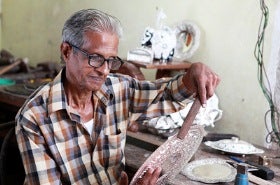 Sri Lanka's population is young now, but getting older quickly. What does this demographic transition mean to you and for Sri Lanka?
Sri Lanka's population is young now, but getting older quickly. What does this demographic transition mean to you and for Sri Lanka?
Join a live chat Jan. 7 on the World Bank Sri Lanka Facebook page with experts including Indralal De Silva, professor at the University of Colombo; Sundararajan Gopalan, senior health, nutrition, and population specialist with the World Bank; Shalika Subasinghe, social protection consuiltant with the World Bank; and Tehani Ariyaratne of the Center for Poverty Analysis (CEPA).
The discussion will focus on the dimensions of growing old in Sri Lanka and move on to the challenge Sri Lanka is facing in dealing with an aging population with limited resources.
Date: Monday, Jan. 7, 2013
Time: 2:00 – 4:00 p.m., Sri Lanka time (3:30-5:30 a.m. EST)
Place: facebook.com/worldbanksrilanka (click on Like to join the discussion). If you are not on Facebook, create an account by visiting facebook.com.
Sri Lanka is experiencing a demographic window of opportunity conducive for rapid economic development. The key aspects of the demographic transition include the following:
A large workforce: 67% of Sri Lanka’s population is currently working-age. The working-age population will remain significantly larger than the dependent population until 2017. Such a large workforce can play a crucial role in advancing the country’s economy if utilized to its fullest potential.
An aging population: The percentage of elderly (age 60 and over) is expected to increase from 6.6% to 16.7% in 2021. By 2041, one out of every four Sri Lankans is expected to be an elderly person.
An upcoming increase in the dependency ratio: In 2001, there were 55 dependents for every 100 working-age persons. The overall dependency ratio will increase to 55.9 by the year 2016, and to 58.3 by the year 2031. As a result of rapid increase in old-age dependency, which outpaces the decline in youth dependency, the projected overall dependency will increase significantly after 2041.
What can you do?
Participate in this online discussion, contribute your ideas and suggestions of how Sri Lanka can better manage the demographic transition, and learn how you as an individual can make a difference. If you are based outside Sri Lanka or aware of how other countries have managed such a situation, we welcome your contributions.
Connect. Comment. Contribute for Sri Lanka’s development!


Join the Conversation